The Bottled Water Issue
Resources Re: Bottled Water
Corporate Accountability International
Polaris Institute
Katie Couric on Bottle Water
Watch on YouTube
The New York Times, "[New York] City Council Shuns Bottles in Favor of Water From Tap," By Jennifer Lee, June 17, 2008
Read Article
"The City Council has become the latest government agency to take a stand against bottled water. Last week, the speaker's office announced that it would stop buying bottled water for the Council's downtown offices, which went through at least 6,000 single-serving bottles last year. As a result, bottled water will no longer be available at City Council events or official functions...
"In June 2007, San Francisco's mayor, Gavin Newsom, prohibited spending city money on single-serving bottled water. Now, more than 30 cities and towns in the United States and Canada -- from Fayetteville, Ark., to Seattle to Blue Mountains, Ontario -- have taken steps to curtail spending on bottled water, according to Corporate Accountability International, an advocacy group that challenges corporate abuses and which runs the Think Outside the Bottle campaign...
"The movement, however, has raised concern in the beverage industry. Coca-Cola, Pepsi and the American Beverage Association have all increased their lobbying against it. Last year, Coca-Cola and the association passed out fliers at the Conference of Mayors that argued against a resolution, introduced by Mayor Newsom, to study the impact of bottled water on municipal waste..."
Earth Policy Insitute, "BOTTLED WATER BOYCOTTS: Back-to-the-Tap Movement Gains Momentum," December 2007
Read Data
Read about back-to-the-tap initiatives in the following cities: Davis, CA; Emeryville, CA; Los Angeles, CA; San Francisco, CA; San Jose, CA: Santa Barbara, CA; Chicago, IL; Urbana, IL; Louisville, KY; Boston, MA; Ann Arbor, MI; St. Louis, MO; New York, NY: Salt Lake City, UT; Charlottesville, VA; Vancouver, WA; Wauwatosa, WI; Manyly, NSW; Burnaby, BC; Vancouver, BC; Charlotteown, PEI; Town of the Blue Mountains, ON; Ottawa, ON; Toronto, ON; Paris, France; Florence, Italy; Rome, Italy, and Liverpool, UK. States and Counties: California, U.S.; Santa Clara County, CA, U.S.; Cook County, IL, U.S.; Illinois, U.S.; Massachusetts, U.S.; Frederick County, MD, U.S.; Maine, U.S.; Michigan, U.S.; Jackson County, MO, U.S.; New York State, U.S.; Oregon, U.S.; New South Wales, Australia; Cornwall County, UK; Stroud District, Gloucestershire County, U.K. National Governments: Denmark; U.K. Government Agencies; Green Party, U.K. and more.
peopleandplanet.net, "Bottled water backlash is growing," By Janet Larsen, December 7, 2007
Read Article
"From San Francisco to New York to London, Rome and Paris, city governments, high-class restaurants, schools, and religious groups are ditching bottled water in favour of what comes out of the tap. With people no longer content to pay 1,000 times as much for bottled water, a product no better than tap water, a backlash against bottled water is growing."
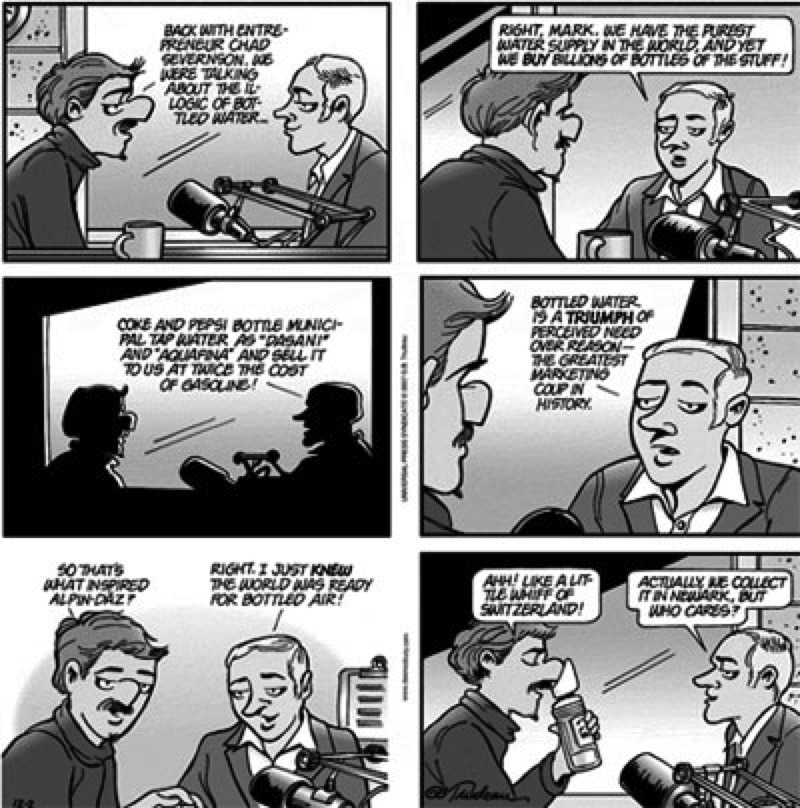
Doonesbury by Garry Trudeau
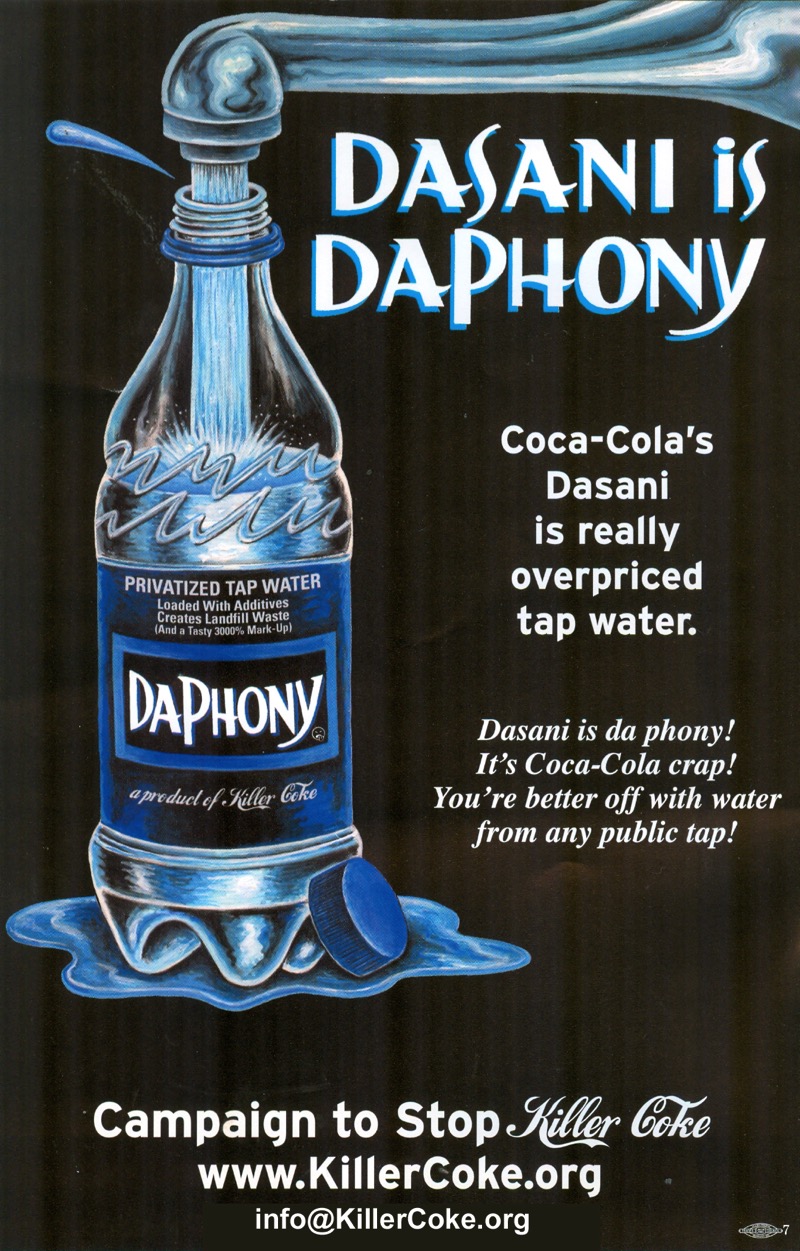
Plenty Magazine, "Drinking Problem: Across the country, folks are working to wean Americans off bottled water," By Dianna Dilworth, November 19, 2007
Read Article
" 'Our fundamental concern is that bottled water companies are changing the way that we think about our water and setting out to turn our water into a high priced luxury and not a fundamental human right,' says Deborah Lapidus, the group's national organizer."
The Seattle Times, "The newest public enemy: bottled water," By Sandy Bauers, November 12, 2007
Read Article
"Bottled water, once an icon of a healthy lifestyle, has become a pariah, the environmentally incorrect Humvee of beverages. In recent months, dissent over the once innocuous bottle of Aquafina or Dasani has grown from a trickle to a tsunami. Not just among enviros who decry the 1.5 million barrels of oil used to make a year's worth of bottles. (Plus more to transport it from, in the case of Tasmanian Rain, the end of the earth.)..."
MSNBC, Video, On water, thinking outside the bottle
Americans are urged to choose tap water because of the ecological toll of bottles. NBC's Anne Thompson reports.
See Video
Click here to take the www.ThinkOutsidetheBottle.org pledge
Bottled water corporations are changing the very way people think about water. Though many bottled water brands come from the same source as public tap water, they are marketed as somehow more pure. What's more - bottled water corporations sell water back to the public at thousands of times the cost. Plastic bottles also require massive amounts of fossil fuels to manufacture and transport. Billions of these bottles wind up in landfills every year.
You can help reverse this trend. At events and over online networks thousands are supporting the efforts of local officials to reduce the environmental harm of bottled water by prioritizing public water systems. Taking the Think Outside the Bottle Pledge is quick, easy, and sends the message that water is a human right, not a commodity.
Democracy Now! "The Bottled Water Lie: As Soft Drink Giant Admits Product is Tap Water, New Scrutiny Falls on the Economic and Environmental Costs of a Billion Dollar Industry," August 1, 2007
Watch Democracy Now
Gigi Kellett. Associate Campaigns Director at Corporate Accountability International joins us in Boston. The group is spearheading the Think Outside the Bottle Campaign.
Michael Blanding. Freelance journalist and author of the article for Alternet.org "The Bottled Water Lie" and "The Case Against Coke" for The Nation
Alan Snitow. Award-winning documentary filmmaker and journalist. His films include "Thirst", "Secrets of Silicon Valley", and "Blacks and Jews". Co-author of "Thirst: Fighting the Corporate Theft of Our Water.
Daytona Beach News-Journal, "Message in a bottle: Plastic 'souvenirs' raise recycling concerns, By Jim Haug, September 18, 2007
"The Container Recycling Institute estimates that four out of five plastic water bottles end up in a landfill or incinerator instead of getting recycled. The city's bottles are recyclable but are not made from recycled materials. Of all the recyclable materials, plastic takes the longest to decompose, said John Anguilli, the interim director of solid waste for Volusia County.
"The other knock against water bottles is that they use up a precious resource. The Earth Policy Institute reported that 1.5 million barrels of oil a year are needed to manufacture the nation's water bottles, a figure that doesn't include the oil needed to transport the bottles."
The Daily Texan, "Watchdog group protests bottled water companies on West Mall," By Anita Avram, September 17, 2007
Read Article
"A few members of the organization [Corporate Accountability International] set up a table to conduct a water taste test. Participants received four cups of water, one filled with tap water and the remaining three cups filled with a different brand of bottled water. Participants then guessed which cup had which water. 'These bottled waters are indistinguishable in quality from tap water,' former UT professor John Williams said after taking the taste test...'These bottled water companies are making a lot of money by hoodwinking the public into thinking their water is cleaner and purer.' "
the Justice (Brandeis University), "EDITORIAL: Drink straight from the tap," September 11, 2007
Read Editorial
"It is our job as a university to lead the way. As Brandeis demonstrates its commitment to the "greenification" of its campus with the construction of environmentally sustainable buildings, now is the perfect time to show that our community, not just our architects, is dedicated to preservation. The tradeoff is easy: Give up the tap water that the Coca-Cola company puts into bottles for you, and drink from your own tap. If it's a purification process you need, get a Brita filter."
The Seoul Times (South Korea), "What Does Coca Cola's Dasani Bottled Water Have in Common with Death by Lethal Injection?" By Stephen Fox, August 31, 2007
Read Article
"The third largest ingredient in Dasani is potassium chloride. If you are to be put death, first you get a barbiturate, then a paralytic agent, and then the chemical to stop your heart (what a coincidence!) you guessed it: potassium chloride! "If you take everything out of the water, you don't get the crisp, clean taste that consumers desire," was the sanguine comment of Kim Price, spokesman for Coca-Cola. Question from Student at Oregon State University: I just noticed potassium chloride was listed as an ingredient in some bottled waters (Dasani, for example). But I remember from Chemistry and other sources of information KCl is used for lethal injections and is often times hazardous... so why would it be in bottled water?"
"From Wikipedia, on Potassium chloride:
"The chemical compound potassium chloride (KCl) is a metal halide composed of potassium and chlorine. In its pure state it is odorless. It has a white or colorless vitreous crystal, with a crystal structure that cleaves easily in three directions. Potassium chloride crystals are either simple cubic or face-centered cubic depending on what atoms are involved. If only potassium or chlorine atoms are considered, then the structured is face-centered cubic. However, both atoms form a crystal with a simple cubic structure: x-ray diffraction analysis will yield a simple cubic structure. Potassium chloride is also commonly known as "Muriate of Potash". Potash varies in color from pink or red to white depending on the mining and recovery process used. White potash, sometimes referred to as soluble potash, is usually higher in analysis and is used primarily for making liquid starter fertilizers. KCl is used in medicine, scientific applications, food processing and in judicial execution through lethal injection. It occurs naturally as the mineral sylvite and in combination with sodium chloride as sylvinite."
TheStreet.com, "Bottled Water Is Draining Your Bank Account," By Jeffrey Strain, August 28, 2007
Read Article
"If you drink bottled water three times a day and buy it from a vending machine for $1 a bottle, switching to tap water will save you over $1,000 a year. Even if you buy your bottled water in bulk, you will save several hundred dollars a year by switching to tap water."
OneWorld South Asia, "Bottled water costs us the earth," By Sunita Narain, August 28, 2007
Read Article
"In the water and economically-rich world, bottled water started as a luxury-a non-essential item of desire, health and status. The water came from fancy mountain streams: they were packaged and sold as mineral-filled sparkling water. It was different from tap water and a healthy (and snobbish) alternative to sweet and street smart colas. But soon, the industry grew. In most cases, the companies sold water that was not sourced from mountain springs but from public water: municipal water sources. Once the snob habit was formed and the market created, the companies simply packaged tap water in most cases into plastic bottles and sold it from supermarkets."
Marketing Web (South Africa), "Think Outside the Bottle," By Tracey Wraight, August 23, 2007
Read Article
"Have you heard of those restaurants in America that sell air? No jokes - air. Flavoured, purified and enhanced, oxygen bars around the world are tapping into a new public trend and are making a killing by selling a tankard of O2 for $13 a pop - what's more, people are sucking it up. Tracey Wraight warns that before you utter a snide "only in America," bear in mind that you are probably no different. Water, just like air, is readily available, and apart from your levies, it's largely free. Instead of turning a tap on, we would rather shell out R25 for a bottle of designer water."
The New York Times, "Keeping Cool, Clear Tap Water," Editorial, August 18, 2007
Read Editorial
"Americans have some of the best water in the world -- a bragging point that seems to have gotten lost lately, even by those who take their daily exercise by waving the flag. Perhaps it is because the bottled water industry markets their product with waterfalls and soothing colors to make it seem like the clearest, cleanest, healthiest drink on earth. Unfortunately, that marketing can make tap water seem less clear, less clean and less healthy...The fear is that if too many people convert to bottled water, there would be even less political support for such spending. The last thing America needs is two water streams -- one for the rich and another for the rest of us."
Houston Chronicle, "BOTTLED-WATER BACKLASH: Rethink water, Cost-conscious Americans can still turn the tap to quench thirst," By Nicki Britton & Mary Vuong
Read Article
"Tap water is as hot as a Houston parking lot. It's safe to drink, supercheap, calorie-free and spiked with tooth decay-preventing fluoride, making you wonder why it fell out of favor in the first place. And while bottled water may have been the trendy choice for the past few decades - last year we drank 8.3 billion gallons of it, or 23 times the amount we did in 1976 - today, a backlash is bubbling. In Houston, tap water costs about a quarter of a cent per gallon. Bottled thirst quenchers can run a buck or two for a quarter that amount."
The New York Times, "Water, Water Everywhere, but Guilt by the Bottleful," By Alex Williams, August 12, 2007
Read Article
"In the last few months, bottled water -- generally considered a benign, even beneficial, product -- has been increasingly portrayed as an environmental villain by city leaders, activist groups and the media. The argument centers not on water, but oil. It takes 1.5 million barrels a year just to make the plastic water bottles Americans use, according to the Earth Policy Institute in Washington, plus countless barrels to transport it from as far as Fiji and refrigerate it."
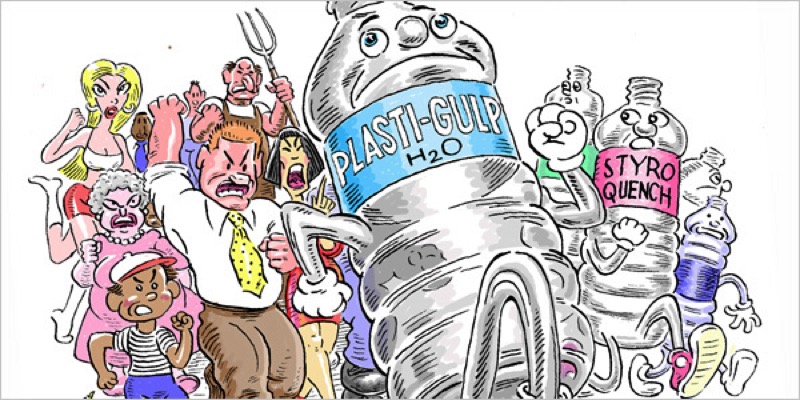
Graphic by Robert Grossman
The New York Times, "In Praise of Tap Water," Editorial, August 1, 2007
Read Editorial
"...if you choose to get your recommended eight glasses a day from bottled water, you could spend up to $1,400 annually. The same amount of tap water would cost about 49 cents...The more the wealthy opt out of drinking tap water, the less political support there will be for investing in maintaining America's public water supply. That would be a serious loss. Access to cheap, clean water is basic to the nation's health."
National Resources Defense Council, "Bottled Water: Pure Drink or Pure Hype?"
Read Report
Read Executive Summary
Read Petition to FDA
"This is the online version of NRDC's March 1999 petition to the FDA and attached report on the results of our four-year study of the bottled water industry, including its bacterial and chemical contamination problems. The petition and report find major gaps in bottled water regulation and conclude that bottled water is not necessarily safer than tap water..."
Newsday, "[New York] City seeks to pull plug on bottled water,"By Justin Rocket Silverman, July 13, 2007
Read Summary of Article
" 'We don't look at it as losing money, we look at is as investing in the world,' said Del Posto co-owner Joe Bastianich, who said the restaurant will make and sell its own mineral water on site using tap water...[Emily Lloyd, commissioner of the city Department of Environmental Protection] said she understands that New York is a 'grab and go city,' but the hope is that once residents get used to drinking tap water, they will carry a reusable water bottle."
Business Week, "Coca-Cola: Competitors smeared Dasani," By Harry Weber, July 12, 2007
Read Article
"Dasani was launched in Argentina in October 2005, and then released in other countries in Latin America. Immediately following the launch, Coca-Cola said, the brand was maligned as "bottled tap water" and "cancer water" on the Internet...Outside Coke's annual meeting in 2006, activists were offering a tapwater challenge to passers-by to try to demonstrate that Dasani tastes no better than municipal tap water but is much more expensive."
Forbes, "Coca-Cola's Dasani water case against Danone in Argentina dismissed," August 13, 2007
Read Article
"The judge ruled that there had been no financial prejudice because Coca-Cola had only been marketing the water for a short time."
Life Style Extra, UK News, "Brits 'Should Go Green By Drinking Tap Water'," July 13, 2006
Read Article
" 'Most containers for bottled water are made from non-degradable plastics, which take a 450 years to break down when disposed of in landfill sites. Even glass bottles of water still take a lot of energy to crush and recycle, whereas all we do with a restaurant glass of water is wash it up afterwards.' "
Penn & Teller, "The Truth About Bottled Water," June 30, 2007
Watch on YouTube
"The craze of bottled water is a national obsession but tap water is usually safer for you, and often better tasting too. Using a hidden camera, Penn & Teller will take a look at the obsession."
Newsweek MSNBC, "Environment: A Good Drink at the Sink," July 2-9, 2007
Read Article and See Video
"Nothing irks Salt Lake City Mayor Ross (Rocky) Anderson more than seeing people tote water in plastic bottles. In fact, he argues, his city has some of the best tap water in the country. Several months ago, Anderson instructed department heads to stop buying bottled water for the city's 2,200 workers and provide coolers and fountains instead. 'For a long time, I've viewed [bottled water] as a huge marketing scam,' he says."
Tap Water vs. Bottled Water
Watch on YouTube
MSNBC (Associated Press), "S.F. mayor bans bottled water at city offices: Global warming and saving taxpayer money cited as reasons," June 25, 2007
Read Article
"[Mayor Gavin] Newsom has issued an executive order banning city departments from buying bottled water, even for water coolers. In a press release announcing the decision, the mayor cited the environmental impact of making, transporting and disposing of the bottles. More than a billion of them end up in the state's landfills each year, the release said."
Jim Hightower, "Why Not Drink 'Local?'," June 29, 2007
Read/Listen to Commentary
"In a triumph of marketing over reasoning, the bottled water industry has turned us into conspicuously silly consumers. Controlled by a handful of global conglomerates (such as Coca Cola and Nestle), the water industry has created the fantasy that if it's in a bottle, it's purer than what comes out of the tap."
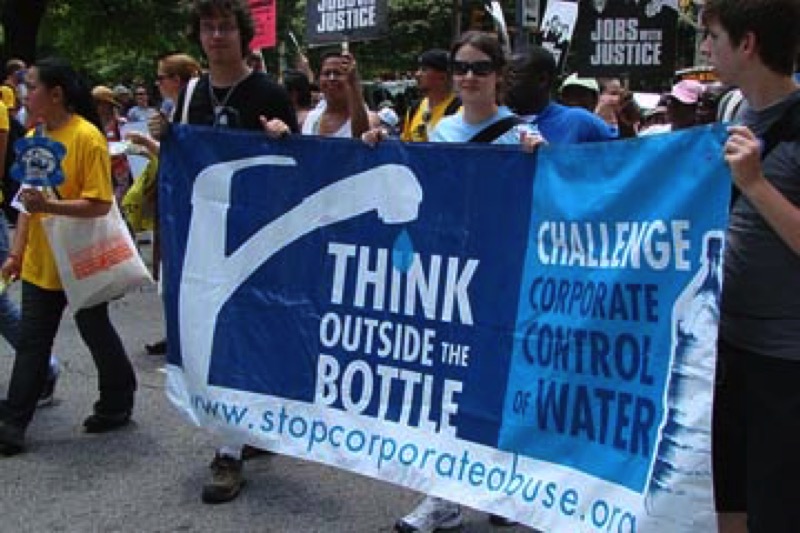
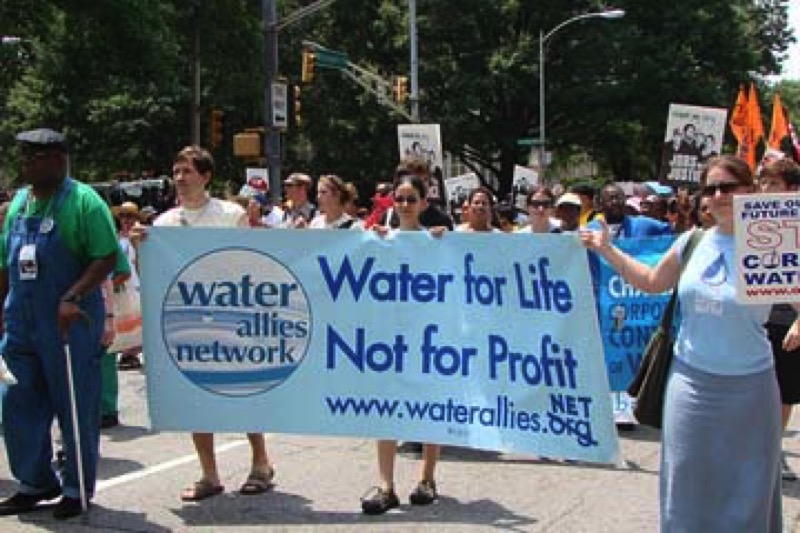
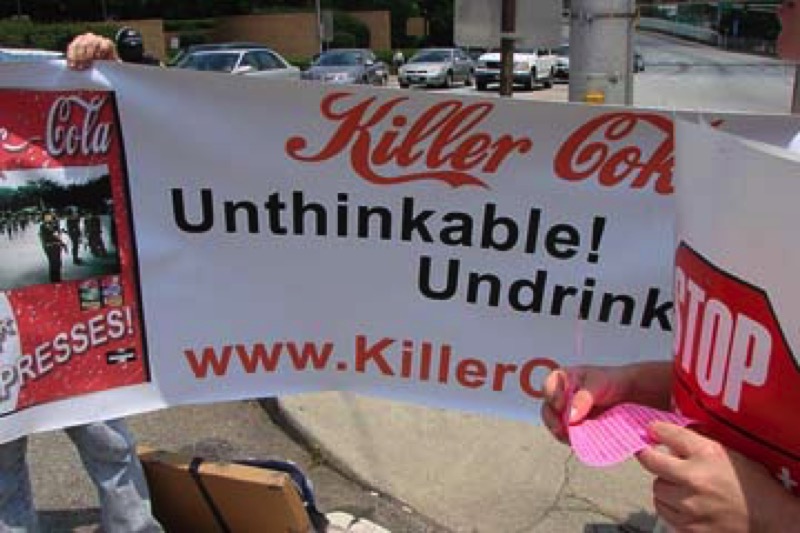
Photos from the U.S. Labor Forum by Nirainjana
Center for Media and Democracy/Environmental News Service, "WWF Greenwashes Coca-Cola," June 5, 2007
Read Article
"WWF, the corporate-funded environmental giant often accused of taking greenbacks in return for greenwashing its corporate benefactors, strikes again."
OneWorld U.S., "Coke Faces New Charges in India, Including 'Greenwashing'," By Aaron Glantz, June 7, 2007
Read Article
"The Coca-Cola company has been charged with illegally seizing lands communally owned by small farmers and indiscriminately dumping sludge and other industrial hazardous waste onto the surrounding community.
" 'The Coca-Cola company and WWF did not dare to include India in this initiative (because) the public in India is increasingly becoming aware of the Coca-Cola company's disastrous relationship with water, and would have to see it for what it's worth — a drop in the bucket,' he [Amit Srivastava] told OneWorld."
Polaris Institute, "The Polaris Institute's Statement at The Coca-Cola Company's Annual General Meeting"
Read About Greenwashing Award
"On behalf of the Corporate Greenwashing Award Selection Committee, I would like to present The Coca-Cola Company with the first ever corporate Greenwashing Award.
"This award is presented to corporations that have pushed revenue and profits higher while putting millions of dollars into covering up environmentally and socially damaging practices using corporate social responsibility projects.
"...we were able to select The Coca-Cola Company as the company that has worked the hardest this year to fool the public that it is an upstanding corporate citizen."
Polaris Institute, "Coca-Cola Company wins Corporate Greenwashing Award"
Read Article
""After careful consideration, the Coca-Cola Company stood out as the company that has worked the hardest this year to present itself as socially and environmentally responsible - while continuing to harm environments and communities through the production and distribution of its products", says Verda Cook, Campaigns Coordinator at the Polaris Institute."
Commondreams.org, "The Greenwashing Of America," by Philip Mattera, June 7, 2007
Read Article
"...some companies began to infiltrate the environmental movement itself by contributing to the more moderate groups and getting spots on their boards...In fact, we shouldn't be joining any company's environmental initiative. Human activists should be leading the effort to clean up the planet, and corporations should be made to follow our lead."
Seattle Weekly, "Make Your Own Vitamin Water!" By Jonathan Kauffman, June 7, 2007
Read Article and Recipes
"I consulted with nutritionists, naturopaths, and vitamin dealers to develop the following recipes, each the equivalent of a VitaminWater variety. With the purchase of a few easy-to-find household chemicals and some crystalline fructose, enterprising cooks and chemists will find the recipes simple to mix up for their hydration pak or hip flask. Of course, you're looking at an outlay of $60 or so for your first batch. But considering that the cheapest of these drinks costs $1.50 a bottle, you'll see a return on your investment in no time.
"However, when you weigh the benefits of buying and recycling a glass bottle of juice versus inflicting four 20-ounce plastic bottles of VitaminWater upon Mother Earth, you may come to the same realization that I did: It's no longer your call to make, is it?"
CNNMoney.com, "Bottled water: No longer cool?: Activists turn up the heat on Coca-Cola, PepsiCo and Nestle, says Fortune's Marc Gunther," By Marc Gunther, April 25 2007
Read Article
"Gina Solomon, a physician and senior scientist with the Natural Resources Defense Council, who oversaw the group's 1999 study, uses a low-cost filter at home and a reusable bottle of tap water.'People complain about the cost of gasoline,' Solomon says. 'No one seems to realize that they are paying for a picture of pretty mountains on the label and a product they could get for free from their own tap.'
"Salt Lake City's outspoken mayor, Rocky Anderson asked city officials to stop handing out bottled water at meetings. 'The environmental impacts surrounding the production, shipment and disposal of bottled water do not fit within the city's goal to conduct itself in an environmentally sustainable way,' Anderson wrote.
"A handful of high-end restaurants - including Chez Panisse in Berkeley, the home of celebrity chef Alice Waters - have stopped serving bottled water.
St. Cloud Times, "Times Writers Group: Bottled water hurts environment," By Jeanette Blonigen Clancy, February 26. 2007
"We've been had. We buy expensive bottles of water when we could just turn on a faucet. How expensive? According to The Sierra Club, bottled water costs 1,000 times more than tap water...The National Resources Defense Council tested bottled water and found a third of it contaminated with bacteria, synthetic chemicals and arsenic. The FDA's regulations on bottled water are weaker than the EPA's regulations on tap water."
Park Slope Reader, "Water, water everywhere, but is it green to drink?" By Elizabeth Ruksznis, Winter 2007
Read Article
Read "Bottled Water: Top 10 Reasons Not to Buy It
Sierra Club, "Corporate Water Privatization: Bottled Water Campaign"?
Go to the Sierra Club's Bottled Water Campaign Website
"How safe? Many people think bottled water is safer than tap water. There is no such guarantee. The Environmental Protection Agency (EPA) has strict water quality standards for tap water, but the EPA does not oversee bottled water. Bottled water sold across state lines is regulated by the Food and Drug Administration (FDA). The FDA interprets EPA clean drinking water regulations and applies them selectively to bottled water. While the FDA requires water sources to be 'inspected, sampled, analyzed and approved,' it only has one inspector so the industry does the inspecting. Nor do the FDA regulations prevent bottling companies from drawing water next to industrial sites, underground storage tanks, or dumps."
Sierra Club, "Bottled Water: Learning the Facts and Taking Action"
Read the Sierra Clubs Brochure on Bottled Water
The Christian Century, "Is Bottled Water a Moral Issue?" January 9, 2007
Read Article
"Rooted in the notion that clean drinking water, like air, is a God-given resource that shouldn't be packaged and sold, a fledgling campaign against the bottling of water has sprung up among religious groups."
" 'It's putting marketing hype ahead of science,' Katz said. 'The science here is not ready for primetime. There is a hint in animal research and in very early studies that EGCG can boost metabolism a little bit, but we don't know if that contributes to weight control.' "











